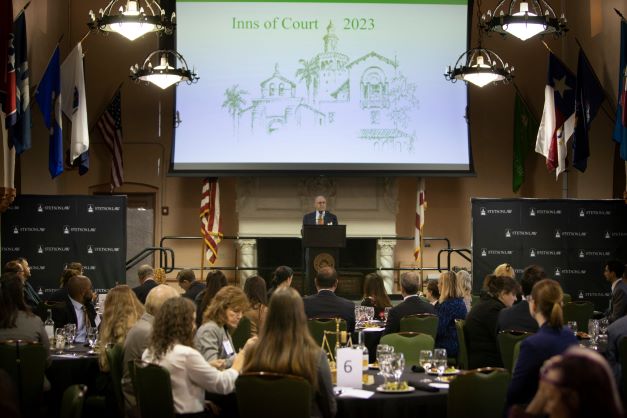Inns of Court: Steve Binder Reflects on Transformative Work on Homelessness

Speaking to members of the Stetson Law community gathered in the Great Hall, Steve Binder reflected on the transformative potential of a career in law – especially in helping society’s most vulnerable.
Known for developing the Homeless Court Program in San Diego, which dozens of other communities have since adopted, Binder was the Wm. Reece Smith, Jr. Distinguished Lecturer at the 2023 edition of Stetson Law’s Annual Inns of Court banquet.
“Many law students seek to use their skills to one day change the world – and Steve Binder, indeed, has,” said Stetson Law’s Wm. Reece Smith, Jr. Distinguished Professor of Law Kristen Adams said as she introduced him to the audience. “He developed an alternative court system that considers the unique challenges of being unhoused in determining the outcome in each case.”
A lifelong passion for helping the unhoused
Born in Flint, Michigan, he was in junior high when he discovered the cause to which he would ultimately dedicate his career when a class visit to a homeless shelter brought him face to face with the economic and legal toll homelessness can have on those lacking a support system.
As a young lawyer in San Diego County in the late 1980s, Binder saw how unfair the criminal justice system was to homeless people with substance abuse, mental health challenges, and a lack of financial resources – and how focusing on punishment over rehabilitation can push vulnerable individuals further from society. Many were cited for sleeping in public, and were either given a fine they couldn’t pay or arrested with less than a fighting chance of beating the charges in court.
“When a homeless case did come to court, I heard tales of hardship and renewal,” Binder said.
Some came to court telling me they had recently found a place to live. Many asked, Where am I supposed to go? Homeless shelters are full.”
Some came to court carrying all of their worldly belongings. Some hadn’t showered. Others spouted FBI and CIA conspiracy theories. All, he said, struggled with problems the criminal justice system ignored.
“Invariably, a judge would take the plea and sentence them to an array of fines that they couldn’t afford, and terms and conditions that frustrated their continued participation in society,” Binder said. “More often than not, homeless defendants failed to appear in court – not because of a disregard of the court system, but due to their status and condition.”
Pervasive problem, creative solutions
The experience inspired him to create the Homeless Court Program, a local court system model that takes into consideration the needs and limitations associated with poverty and homelessness. Such entities now operate in dozens of jurisdictions throughout the U.S.
They build on partnerships between courts, homeless services organizations, and other entities and substitute participation in services and activities for fines and custody. To help offset the challenge of getting to the courthouse for multiple hearings, the programs try to resolve cases in one hearing.
Binder said there are four basic principles of a Homeless Court Program: Participation is voluntary, there’s a progressive disposition of cases, a non-traditional sentencing structure, and the assurance that no one goes into custody.
Individuals are invited – but not forced – to participate in programs and services to help them avoid further legal troubles, such as life skills courses, substance abuse treatment, literacy classes, or counseling.
“The homeless court reinforces this work and the work of participants with a sentencing structure that is not coercive or punitive in nature, but rather designed to assist participants with reintegration into the community,” Binder said. “It gives credit for time served for participation in program activities.”
Now in place at dozens of jurisdictions throughout the U.S., these programs have helped countless individuals experiencing homelessness find more positive life paths. And though it doesn’t address the underlying reasons homelessness is so widespread or eliminate its associated challenges, Binder said it’s important to not lose hope. “While the continued problems homelessness represents are discouraging and frustrating, it’s important to remember it’s the condition homelessness represents that’s undesirable, not the people.” “The criminal justice system will not solve homelessness. Treatment, service, community, and trust are needed if we are serious about addressing the myriad of problems homelessness represents.”
Honoring a public service titan
The event is one way Stetson Law continues to honor the legacy of the late, legendary Florida lawyer William Reece Smith Jr. Inducted into Stetson Law’s Hall of Fame in 2004, he served Stetson for decades as a distinguished professorial lecturer, Board of Overseers member, and university trustee.
“For those of you who did not have the pleasure of knowing Reece, he was a legal icon, a mentor, an advisor, a teacher, a champion of civil rights, and a consummate professional who upheld the highest of ethical standards,” said Stetson Law Interim Dean Theresa Pulley Radwan at the start of the event.
The Inns of Court banquet was inspired by an English mentoring program for barristers dating back centuries. A reflection of the profound value the Stetson Law community places on mentorship, the program gives Stetson Law students an opportunity to connect with prominent lawyers on current topics concerning law and ethics.
Post date: March 30, 2023
Media contact: Kate Bradshaw
[email protected] | 727-430-1580